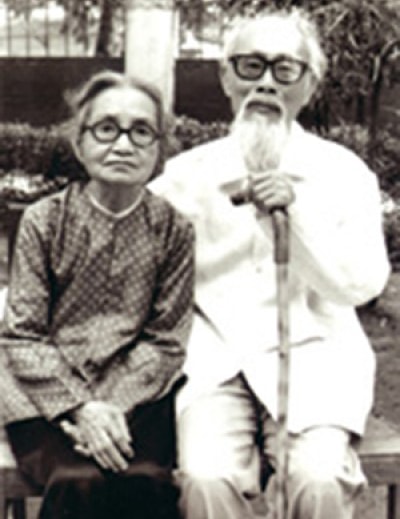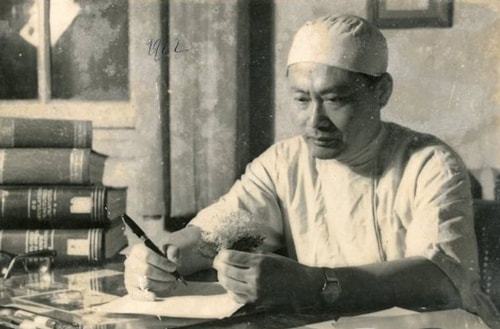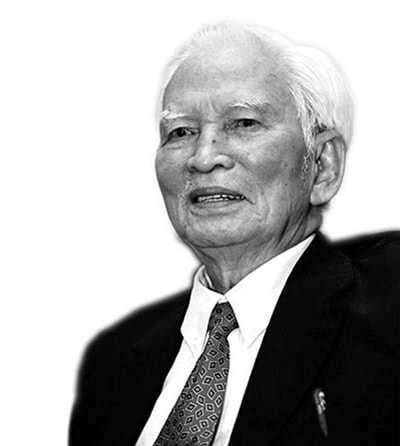Great Vietnamese intellectuals who studied at French schools
More or less benefiting from the French education system built in Vietnam in the early 20th century, many students became great intellectuals of the nation.
For nearly a century, French education in Vietnam received mixed reviews. In 1905, Phan Boi Chau said that France "only taught French writing and speaking French, temporarily enslaving France". However,The unintended positive aspect of France was the creation of a class of intellectuals with university degrees, mastering advanced science and technology.
20th century encyclopedist Dao Duy Anh
Dao Duy Anh (1904-1988) was a famous Vietnamese historian, geographer, lexicographer, linguist, cultural, religious and folklore researcher. He was born in Thanh Hoa, originally from Thanh Oai district, Ha Tay (now part of Hanoi).
In 1923, he graduated from Thanh Chung (Hue National School) and then taught at Dong Hoi School (Quang Binh). Three years later, he co-founded the newspaper Tieng Dan with Huynh Thuc Khang and then joined the Vietnam Revolutionary Party (later the Tan Viet Party).).
 |
Professor Dao Duy Anh and his wife. Photo: Archive |
The first scientific field that Dao Duy Anh was interested in was lexicography. He successively completed and published the Sino-Vietnamese Dictionary (1932) and the French-Vietnamese Dictionary (1936). These were essential reference tools for many generations of high school students.is considered as a bridge betweenthe old generation follows Confucianism and the young generation follows Western learning.
Nearly 40 years later, he published a unique, specialized dictionary, the Tale of Kieu Dictionary (1974). Although he was not the first Vietnamese dictionary compiler, Dao Duy Anh laid the foundation for modern lexicography.
In the field of history, in 1938, his work Outline of Vietnamese Cultural History together with Nguyen Van Huyen's Annamite Civilization (la Civilization Annamite, 1944) marked and laid the foundation for the formation of modern Vietnamese cultural studies based on the spirit of science and nationality.
Some of his typical works in this field such as Confucian Criticism Essay (1938), Outline of Chinese History (1942), Essay on Kim Van Kieu (1943) were received and welcomed by domestic intellectuals and many world scholars.
He accumulated knowledge about many other social sciences such as Philosophy, Ethnology, Sociology by historical methodology and historical documents. From a graduate of Thanh Chung, with the will to self-study, Dao Duy Anh became an encyclopedist of the century.
Ton That Tung - author of standardized liver resection method
Professor Ton That Tung (1912-1982) was a famous doctor in Vietnam and the world in the field of liver surgery. He was born in 1912 in Thanh Hoa and grew up in Hue.
Born into a family of mandarins of the Nguyen Dynasty, he did not pursue a career as a mandarin. In 1931, he went to Hanoi to study at the Protectorate High School, and two years later studied at the Hanoi Medical School - a member of the Indochina University with the concept that medicine is a "free" profession, without distinction of class..
 |
Professor, Doctor Ton That Tung. Photo courtesy |
Once he discovered that a patient's liver had worms in the bile ducts, he came up with the idea of using the infected liver to dissect the liver's structure.
In the following years, from 1935 to 1939, using only a rudimentary scraper, he dissected over 200 cadaver livers to study the blood vessels and drew a comparative diagram. On that basis, he wrote and successfully defended his medical doctoral thesis with the title "How to divide the blood vessels of the liver".
The thesis was highly appreciated and became the premise for his famous scientific works. With this thesis, Ton That Tung was awarded a silver medal by the University of Paris.
When Ton That Tung became a resident physician at Phu Doan Hospital (the predecessor of today's Viet Duc Hospital), after many times cutting the livers of dead people, he proposed his method to his instructor.This method was then sent to the Paris Academy of Surgery and was fiercely attacked by leading professors, because Ton That Tung's idea was too new.
It was not until 1952, at the International Surgery Conference in Copenhagen (Denmark), that his standardized liver resection method was recognized. Ton That Tung was noticed by the international medical community and praised as "the father of standardized liver resection".
Later, he made many contributions to Vietnamese medicine as Head of the Department of Surgery (Hanoi Medical University), Director of Viet Duc Hospital, and Deputy Minister of Health of the Democratic Republic of Vietnam.
Professor Hoang Nhu Mai - Leading scholar in literary research
Professor and People's Teacher Hoang Nhu Mai (1919-2013) was originally from Hanoi, born and raised in Lang Thuong district (Bac Ninh province). When he entered kindergarten (today's first grade), an old teacher taught him a love of literature, through lessons on Chinese characters, Vietnamese characters and French.
When he was 8 or 9 years old, his older brother once took him to Hanoi to go to the cinema and heard with his own eyes the actor's line to his lover, "Your eyes are as blue as the Mediterranean Sea" in French. That line remained in the boy's mind for many years to come.
After finishing primary school, he went to Hanoi to attend Bao Ho High School (Buoi School) in the French-Vietnamese education system, where he studied French literature including many great authors of the 16th-18th centuries and romantic authors of the 19th century.
The novel that first made a strong impression on him was Lamartine's Graziella, especially the nostalgic poem at the end of the book, The First Hatred, translated into Vietnamese by Nguyen Van Vinh. Sixty or seventy years later, he still knows by heart many passages from this novel..
 |
Professor Hoang Nhu Mai. Photo: Van Hien University |
The years studying at Buoi School were also the period when the New Poetry movement flourished, so Hoang Nhu Mai's generation found their own poets. He admired Xuan Dieu but most enjoyed reading The Lu, J. Leiba Thai Can, Luu Trong Lu and later Vu Hoang Chuong, Tran Huyen Tran.
After that, Hoang Nhu Mai studied at the University of Medicine and the Indochina University of Law in Hanoi. In 1943, while a student at the University of Law, he began teaching at the Dong Hai Private High School (Hai Duong).
Five years later, he was invited by the Viet Minh Provincial Committee of Thai Binh province to be the principal of Phan Thanh High School. After that, he successively worked as a lecturer and principal at Viet Bac Pedagogical School (1951), Central Intermediate Pedagogical School (1953), Hanoi University (1959), and Ho Chi Minh City University (1980).
He left behind a rather large legacy of literary research. The textbook Modern Vietnamese Literature (1945-1960) by Hoang Nhu Mai has its own value, because this is the first groundbreaking work, researching a literary journey that was still fresh and hot at that time.
The monographs and essays on poetry "Poetry of a Time", "National Identity in Ho Chi Minh's Poetry" or the stage "Comments on Cai Luong", Tran Huu Trang - Cai Luong composer, are still valuable to researchers today.
In the field of drama, Professor Hoang Nhu Mai also left his mark with research works such as Hanoi Drum, Border River, and Portrait of Mr. Do Chieu..
According to VNE
| RELATED NEWS |
|---|

